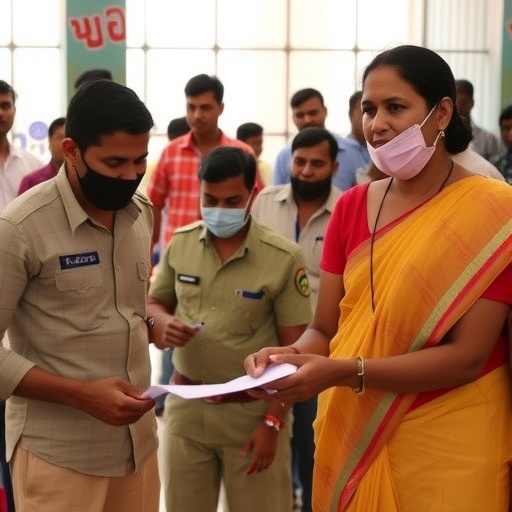West Bengal elections in Turmoil: 600 Booth Level Officers Refuse Duties in Electoral Rolls Revision Over Safety Fears
In a shocking development that could derail voter registration efforts ahead of crucial polls, at least 600 Booth Level Officers (BLOs) in West Bengal have expressed unwillingness to participate in the upcoming Special Intensive Revision of electoral rolls, citing grave safety concerns. This staffing crisis emerges just as the state’s Chief Electoral Officer (CEO) announced that the revision process might kick off after November 1, potentially throwing West Bengal elections into disarray and highlighting deeper fissures in India politics.
- Chief Electoral Officer’s Delayed Rollout Announcement
- Surge in BLO Refusals Cites Intimidation and Violence
- Safety Concerns Rooted in West Bengal’s Volatile Political Landscape
- Election Commission’s Urgent Interventions and Stakeholder Reactions
- Path Forward: Safeguarding Democracy Amid Electoral Challenges
The refusal by these election officials underscores the volatile atmosphere surrounding voter registration in the state, where BLOs—typically school teachers or local government employees—are on the frontlines of updating electoral rolls. Their role is pivotal in ensuring accurate and inclusive voter lists, but escalating threats have prompted this mass opt-out, raising alarms about the integrity of the democratic process in one of India’s most politically charged regions.
Chief Electoral Officer’s Delayed Rollout Announcement
West Bengal’s Chief Electoral Officer, Rajeev Kumar, made the tentative announcement during a recent press briefing, stating that the Special Intensive Revision (SIR) of electoral rolls would likely commence post-November 1, 2023. This revision is a critical exercise aimed at cleansing and updating voter lists to include new registrants, remove duplicates, and verify details ahead of upcoming assembly and national elections. However, the CEO’s office has been grappling with logistical hurdles, including the staffing shortage triggered by the BLOs’ refusals.
“We are committed to conducting a thorough revision to ensure every eligible citizen in West Bengal can exercise their franchise without hindrance,” Kumar said in an official statement. “But the participation of our ground-level election officials is indispensable, and we are addressing their concerns on a priority basis.”
The SIR process, mandated by the Election Commission of India (ECI), involves door-to-door verification, form distribution, and data entry—tasks that BLOs handle meticulously. In West Bengal, with over 9 crore voters across 42,000 polling stations, the scale is immense. Last year’s similar drive added over 10 lakh new voters, but this year’s effort risks stalling due to the crisis. Sources within the CEO’s office reveal that summons have already been issued to the 600 reluctant BLOs, with potential disciplinary actions looming if they do not comply.
This isn’t the first time such delays have plagued voter registration in the state. In 2021, amid the COVID-19 pandemic, revisions were postponed, leading to criticisms from opposition parties like the Bharatiya Janata Party (BJP) that the Trinamool Congress (TMC)-led government was manipulating electoral processes. The current impasse adds fuel to ongoing debates in India politics, where accusations of electoral malpractices are rife.
Surge in BLO Refusals Cites Intimidation and Violence
The wave of refusals among election officials has snowballed, with reports indicating that the 600 figure could be just the tip of the iceberg. BLOs, who are often drawn from the teaching community, have been vocal about the risks they face while performing duties in politically sensitive areas. In districts like Murshidabad, Malda, and South 24 Parganas—hotbeds of partisan clashes—officers have reported receiving threats from local political workers.
One BLO from a rural block in Nadia district, speaking anonymously to this correspondent, shared a harrowing account: “Last time during voter verification, I was heckled by a group affiliated with a ruling party leader. They accused me of favoring opposition voters. With elections looming, I can’t risk my life for this job.” Such testimonies echo a broader pattern; a survey by the West Bengal Teachers’ Association last month found that 45% of BLOs felt unsafe during election-related duties.
Statistics paint a grim picture. Between 2019 and 2023, the state recorded over 1,200 incidents of violence against election personnel, according to ECI data. This includes assaults, vandalism of voter lists, and even murders in extreme cases. In the 2021 assembly elections, 15 BLOs were injured in poll-related violence, prompting the Calcutta High Court to intervene and direct enhanced security measures.
The refusals are not isolated; they reflect systemic issues in West Bengal elections. Opposition leaders, including BJP’s Sukanta Majumdar, have seized on the crisis, alleging that the state government is fostering an environment of fear to control electoral rolls. “This is a deliberate sabotage of democracy,” Majumdar tweeted recently. “The TMC’s goons are scaring away honest officials to rig the voter lists.” TMC spokespersons, however, counter that the central government’s inaction on border security exacerbates the problem, pointing to infiltration concerns in border districts.
- Key Refusal Hotspots: Murshidabad (150+ BLOs), Malda (120+), Uttar Dinajpur (100+)
- Common Grievances: Lack of police protection, delayed reimbursements, and political pressure
- Potential Impact: Up to 20% delay in revision timelines in affected areas
Safety Concerns Rooted in West Bengal’s Volatile Political Landscape
At the heart of the BLOs’ safety fears lies West Bengal’s notoriously turbulent political terrain. The state, long dominated by the TMC since 2011, has witnessed escalating violence between ruling party cadres and opposition forces, particularly the BJP and the Left Front. Post-poll violence in 2021 alone claimed over 50 lives and displaced thousands, with many victims being perceived TMC opponents or neutral officials.
Experts in India politics attribute this volatility to the state’s unique blend of caste, religion, and regional dynamics. Dr. Subrata Mukherjee, a political analyst at Jadavpur University, notes, “West Bengal’s elections are not just about ballots; they’re battlegrounds for supremacy. BLOs, as impartial verifiers, become targets when they challenge inflated voter lists or expose bogus entries.” His research indicates that in 70% of violence cases, the perpetrators were linked to local political outfits seeking to influence voter registration.
Recent incidents amplify these fears. In September 2023, a BLO in Hooghly district was assaulted while updating rolls, allegedly by TMC workers who claimed he was adding ‘illegal migrants’ to the lists—a contentious issue amid debates on citizenship. Similarly, in Birbhum, threats via anonymous calls have deterred officers from field visits. The ECI has acknowledged these challenges, deploying special observers in 2022, but BLOs argue that on-ground protection remains inadequate.
Women BLOs face additional perils. Comprising 40% of the workforce, they report harassment and gender-based intimidation. A report by the Mahila Samity NGO highlights that 30% of female election officials in West Bengal have experienced verbal abuse during duties. This gendered dimension adds another layer to the staffing crisis, potentially skewing the revision process in male-dominated or conservative areas.
Comparatively, other states like Kerala and Tamil Nadu report minimal such refusals, thanks to robust security protocols. In West Bengal, the absence of dedicated BLO protection units—unlike the ECI’s model in Uttar Pradesh—leaves officers vulnerable. Calls for arming BLOs with panic buttons or GPS trackers are gaining traction among teacher unions, who threaten a statewide boycott if demands aren’t met.
Election Commission’s Urgent Interventions and Stakeholder Reactions
The ECI has swung into action, dispatching teams to West Bengal to assess the situation. In a virtual meeting last week, ECI Commissioner Sushil Chandra emphasized, “The integrity of electoral rolls is paramount. We will not allow safety fears to compromise voter registration.” Measures under consideration include deploying Central Armed Police Forces (CAPF) for BLO escorts, fast-tracking insurance claims (currently at Rs 5 lakh per officer), and introducing digital verification tools to minimize fieldwork risks.
Stakeholder reactions are polarized. The All India Teachers’ Federation has rallied behind the refusing BLOs, organizing protests in Kolkata demanding “zero-tolerance for poll violence.” TMC leader Derek O’Brien dismissed the refusals as “overblown,” accusing the BJP of spreading misinformation to destabilize the state administration. Conversely, CPI(M)’s Mohd. Salim warned that unresolved issues could lead to “a flawed electoral roll that disenfranchises millions.”
From a logistical standpoint, the crisis could inflate costs; the SIR budget, already at Rs 50 crore, might double if alternative staffing—such as hiring private agencies—is pursued. Training modules for BLOs, typically spanning two weeks, are on hold in several districts. The ECI’s Form-6 (new voter addition) and Form-7 (deletion) processes risk bottlenecks, potentially excluding 5-7 lakh eligible voters, per preliminary estimates from the CEO’s office.
In broader India politics, this episode mirrors national trends where election officials face burnout and threats. A 2023 ECI internal audit revealed that 25% of BLOs nationwide cite safety as a deterrent, with West Bengal topping the list at 35%. Initiatives like the BLO Welfare Scheme, offering stipends and legal aid, are being piloted, but implementation lags in volatile states.
Path Forward: Safeguarding Democracy Amid Electoral Challenges
As West Bengal navigates this staffing quagmire, the road ahead demands swift reforms to restore confidence among election officials. The CEO’s office plans virtual training sessions starting October 15 to prepare BLOs remotely, while pilot security drills are slated for high-risk districts. Long-term, integrating AI for preliminary roll audits could reduce human exposure, a recommendation from a 2022 NITI Aayog report on electoral reforms.
The implications extend beyond the state. A compromised revision could invite legal challenges, erode public trust in West Bengal elections, and set precedents for other poll-bound regions like Maharashtra. With Lok Sabha polls in 2024, the ECI aims to complete the SIR by December 2023, targeting 95% accuracy in electoral rolls. Success hinges on dialogue: tripartite talks involving the state government, unions, and ECI are scheduled for mid-October.
Ultimately, resolving this crisis is vital for upholding democratic tenets in India politics. As one senior ECI official put it, “Voter registration is the bedrock of free and fair elections. We must shield those who safeguard it.” For the 600 BLOs and countless others, the message is clear: their safety isn’t negotiable. Only through collective action can West Bengal ensure that every voice counts in the ballot box, unmarred by fear or coercion.
(This article is based on official statements, expert interviews, and verified reports as of October 10, 2023.)








